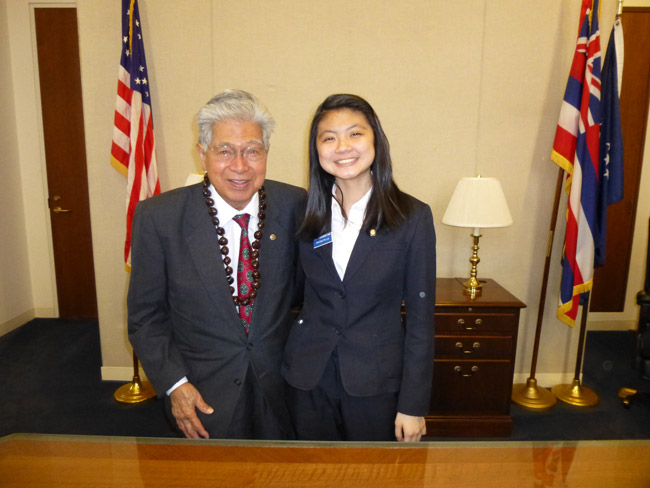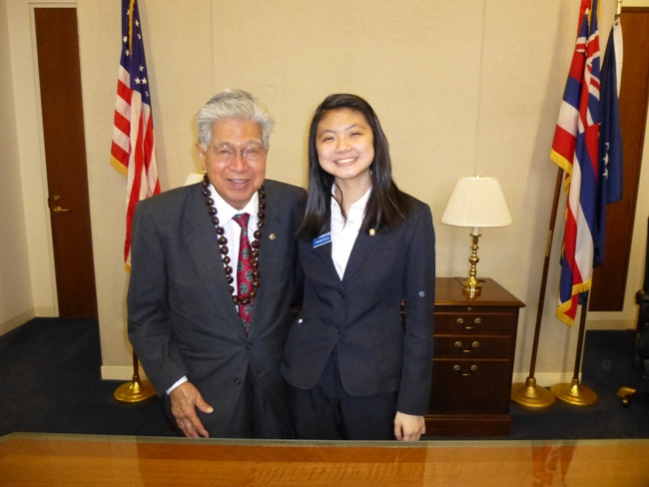Sen. Akaka’s Last Senate Page
Not many high school juniors can say that they have visited the nation’s Capitol, but Maryknoll’s Gwendilyn Liu has visited Washington, D.C., and worked on the Senate floor as a page for Sen. Daniel Akaka.
“Honestly, going into the program, I wasn’t interested in politics,” she admits. “I always saw myself going into education, something along the lines of teaching. But I’ve always liked history and current events.”
Liu happened upon the Senate Page Program somewhat accidentally, as she was conducting research for her advanced American history class.
“It was second trimester, and we were working on our project where we had to do a bill on immigration and get in contact with one of our congresspeople, and if it was a national congressperson, we got extra credit,” she explains. “I was looking at information on Sen. Akaka’s page and it happened to be there. I thought, ‘Why not?'”
Liu opted for the five-month program during the school semester (September to early February). There is also a one-month program during the summer.
“Sen. Akaka is retiring, so it was his last Senate page opportunity,” she says. “And I’m thankful that he gave me the opportunity.”
As a Senate page (along with 29 other students from across the nation), Liu was responsible for many of the day-to-day operations such as running messages and delivering mail.
“It’s not as glamorous as it may seem,” she says with a smile, “and apart from working at the Capitol, another main part of being a Senate page is going to school.”
The pages would wake up at 5 in the morning to get to class by 6 for four hours, then hightail it to work from 10 a.m. to 6 p.m. (or whenever Senate business ended).
“I happened to be in the lucky group that stayed until 5 in the morning one day,” adds Liu, whose name is now in the Congressional record for her extra work time over the holiday season.
It might be hard for even seasoned college students to imagine working a full-time job while taking a rigorous class load, but Liu adapted well.
“We did our own laundry, we made our own food and we woke up on our own … well, my roommates woke me up,” she says with a laugh. “We had to balance going out and seeing the city and studying, but I learned a lot – about time management, especially.”
The entire experience gave Liu a greater appreciation of what goes on in the Senate that is not always seen.
“I was with 29 other kids who are completely involved in politics and current events, and I was at the lower end of that spectrum,” she says. “But they taught me so much, and I think one of the biggest aspects of this program – apart from seeing what goes on in the Senate floor – was being able to meet 29 other kids from across the country, to see their culture and to see how they talk with their accents. That’s probably my favorite part.”
Another monumental experience for Liu was meeting Akaka, whom she said was the favorite among the pages.
“Sen. Akaka would always talk to the pages holding the door for him, and he would take the time to say hi to me,” she says.
One day during a lunch recess, Liu was talking to Akaka in the back lobby.
“There are these two boys on the Republican side who are huge fans of Sen. Akaka. They wanted me to introduce them, and rumor spread that Akaka was talking to the pages,” she explains. “He took the time to personally introduce himself to each page who came up. He had a lunch to go to that we delayed him for, but he still personally took the time to talk to each page, and that was something that everyone still remembers.”
Liu’s exceptional writing abilities also allowed her to speak during the closing ceremony. A contest was held a week before the ceremony, and each page had to write a speech to present to the teachers and principal. Liu was selected, along with two others, to present.
She related her experiences to a book – a book of many pages, as she wrote.
“We can hear about the program, we hear the reviews from other pages about how it changed their life and opened up so many opportunities,” Liu explains. “And then we get the book, and the book is really tough and really big. We don’t understand more than half of it, but we have to first learn about it. We had to learn the senators’ names, where they’re from and how to spell their names.”
One big question now looms over Liu’s head: Where does she want to go for college?
“I do see myself applying to schools, maybe in D.C. or at least in the area, just because I really like the city,” she says. “I’ll go back one day, hopefully.
“I don’t know if I’ll go directly into politics, but if I do or if I don’t, I’ll have this to talk about.”







